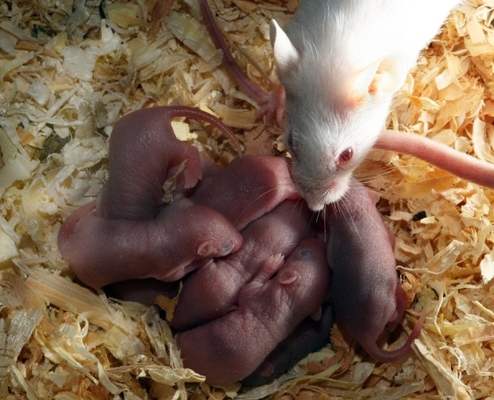According to a recent study using lab mice, it may be. The authors of the study suggest that a similar phenomenon could influence anxiety and addiction in humans. But some researchers are sceptical of the findings because a biological mechanism that explains the phenomenon has not been identified.
Epigenetic inheritance - modifications which alter the expression of genes, but not their actual nucleotide sequence - was suposedly found in laboratory mice who were trained to fear the smell of acetophenone, a chemical which scent has been compared to those of cherries and almonds. The researchers wafted the scent around a small chamber, while giving small electric shocks to male mice. The animals eventually learned to associate the scent with pain, shuddering in the presence of acetophenone even without a shock.
That's when things get interesting: this reaction was passed on to their pups. Despite never having encountered acetophenone in their lives, the offspring exhibited increased sensitivity when introduced to its smell, shuddering more markedly in its presence compared with the descendants of mice that had been conditioned to be startled by a different smell or that had gone through no such conditioning. A third generation of mice — the 'grandchildren' — also inherited this reaction, as did mice conceived through in vitro fertilization with sperm from males sensitized to acetophenone. Similar experiments showed that the response can also be transmitted down from the mother. But how that happens has not been explained yet, and it gets scientists suspicious.
Humans inherit epigenetic alterations that influence behaviour, too, the authors suspect. A parent’s anxiety, they speculate, could influence later generations through epigenetic modifications to receptors for stress hormones. But the researchers are not sure how to prove the case, and they plan to focus on lab animals for the time being. They now want to determine for how many generations the sensitivity to acetophenone lasts, and whether that response can be eliminated. Scepticism that the inheritance mechanism is real will likely persist “until someone can really explain it in a molecular way”, they claim. They also say that “unfortunately, it’s probably going to be complicated and it’s probably going to take a while.”
Epigenetic inheritance - modifications which alter the expression of genes, but not their actual nucleotide sequence - was suposedly found in laboratory mice who were trained to fear the smell of acetophenone, a chemical which scent has been compared to those of cherries and almonds. The researchers wafted the scent around a small chamber, while giving small electric shocks to male mice. The animals eventually learned to associate the scent with pain, shuddering in the presence of acetophenone even without a shock.
That's when things get interesting: this reaction was passed on to their pups. Despite never having encountered acetophenone in their lives, the offspring exhibited increased sensitivity when introduced to its smell, shuddering more markedly in its presence compared with the descendants of mice that had been conditioned to be startled by a different smell or that had gone through no such conditioning. A third generation of mice — the 'grandchildren' — also inherited this reaction, as did mice conceived through in vitro fertilization with sperm from males sensitized to acetophenone. Similar experiments showed that the response can also be transmitted down from the mother. But how that happens has not been explained yet, and it gets scientists suspicious.
Humans inherit epigenetic alterations that influence behaviour, too, the authors suspect. A parent’s anxiety, they speculate, could influence later generations through epigenetic modifications to receptors for stress hormones. But the researchers are not sure how to prove the case, and they plan to focus on lab animals for the time being. They now want to determine for how many generations the sensitivity to acetophenone lasts, and whether that response can be eliminated. Scepticism that the inheritance mechanism is real will likely persist “until someone can really explain it in a molecular way”, they claim. They also say that “unfortunately, it’s probably going to be complicated and it’s probably going to take a while.”
~Ally

 RSS Feed
RSS Feed